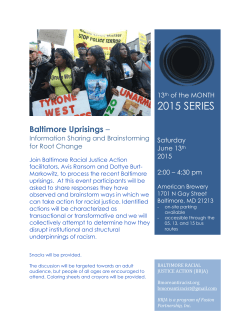
letter to Baltimore City Department of Public Works Director Rudy
To: Rudy Chow Director of the Department of Public Works Baltimore City CC: Mayor Stephanie Rawlings-Blake Members of the Baltimore City Council Date: April 7, 2015 Re: Letter of Concern about Household Water Service Shut-Offs Dear Director Chow, I am concerned about the City of Baltimore’s plan to potentially disconnect water service to as many as 25,000 households as detailed in the Department of Public Works’ March 27th press release. I understand the dilemma that the city faces. Households, along with hundreds of businesses, owe more than $40 million, money that the city desperately needs to help make necessary improvements to our water system. But individual customers are not responsible for the majority of this debt, nor should they bear the burden of paying it off. “In fact, the Baltimore Sun found more than a third of the unpaid bills stem from just 369 businesses, who owe $15 million in revenue, while government offices and nonprofits have outstanding water bills to the tune of $10 million. With the majority of debt resting in businesses’ hands, I ask the City of Baltimore to work with its residents so that together we can find a solution that does not leave our residents without access to a basic human need, water. It is important that the city affirms that we are not the “next Detroit” and that the way we handle water bill arrears does not violate international standards of human rights. The United Nations has recognized that people have a fundamental human right to water and sanitation. This human right obliges governments to ensure safe, sound and affordable water service. Last fall, after visiting Detroit, UN officials clarified how water shut-offs violate this human right in their joint press statement1: “Disconnections of water due to non-payment are permissible if it can be shown that the resident is able to pay but is not paying. When people are genuinely unable to pay the bill, it is the State’s obligation to provide urgent measures, including financial assistance, a specially low tariff or subsidies, to ensure access to essential water and sanitation for all. Not doing so amounts to a human rights violation.” 1 Joint Press Statement by Special Rapporteur on adequate housing as a component of the right to an adequate standard of living and to right to nondiscrimination in this context, and Special Rapporteur on the human right to safe drinking water and sanitation Visit to city of Detroit (United States of America) 18-20 October 2014 http://www.ohchr.org/EN/NewsEvents/Pages/DisplayNews.aspx?NewsID=15188&LangID=E#sthash.Z0XGAtB6.dpuf Baltimore City needs to demonstrate that all households receiving shut-off notices can afford to pay. Many Baltimore families and retirees simply lack the financial ability to pay their bills. Given the scope of the delinquencies and recent increased water rates, it appears that the currently available Low Income Water Assistance Program and the Low Income Senior Water Discount Program are failing to reach all the households who qualify. In addition, I am concerned that shut-off notices are being sent to non-owner occupied housing. Water service is often included in a tenant’s rent, though the owner or landlord is responsible for paying water bills. In these cases, tenants who are up-to-date on their rent could lose water service through no fault of their own if their landlord or building owner is delinquent on the water bills. Disconnecting service to thousands of homes also poses a very real public health threat. Without water service, people cannot flush their toilets or wash their hands. Lack of adequate sanitation can cause diseases to spread and people to become sick. The elderly, pregnant women, children and people with diabetes and other critical illnesses would be especially vulnerable. For these reasons, I stand with Baltimore City residents and advocates who are calling for a moratorium on all water shutoffs until those served with notices have had a chance to have their side considered in public hearings. In addition, I ask the City of Baltimore to allow sufficient time for expanded, one-to-one customer outreach about assistance programs and payment plan options and to do the following in order to accomplish that goal: 1) 2) 3) 4) 5) Cease all disconnections of occupied residential accounts for nonpayment; Cease all disconnections of non-owner occupied rental housing; Restore service to all residences that have been disconnected for nonpayment; Prioritize collections from delinquent commercial and government accounts; and Ensure that every household which qualifies for low income and or senior discounts are automatically enrolled. Before engaging in an extensive shut-off program, the city must investigate and implement a plan to ensure that water service is affordable for every resident. I am confident that, in working together, we can support the city in its responsibility to deliver high-quality drinking water to 1.8 million households in the Baltimore Metropolitan Area, its need to repair its decaying water system infrastructure and its obligation to ensure the public health and fundamental rights of all our residents. I am, as always, willing to work with you to assist in this effort. I would like to speak with you as soon as possible in the spirit of teamwork and cooperation to learn more details about your plans. My office number is (410) 841-3476 your convenience. In Partnership, Mary L. Washington Member, House of Delegates, 43rd District
© Copyright 2025





















